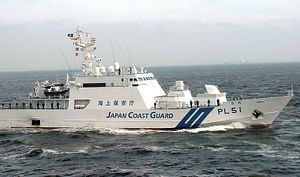So the Naval Diplomat found a seam in the teaching schedule and promptly winged off to Tokyo, there to lend supersecret counsel to the Japan Ministry of Foreign Affairs and Self-Defense Forces. Be afraid, China; be very, very afraid.
While here I have consorted with greatness. A journey down Tokyo Bay to visit the U.S.-Japanese fleet base at Yokosuka included a side trip aboard the battleship Mikasa, Togo’s flagship at Port Arthur, the Battle of the Yellow Sea, and Tsushima Strait. Strikingly, the museum ship’s organizers portray Togo as a peer not just of Lord Nelson, the usual comparison, but also of John Paul Jones of blessed memory, who proclaimed that he had not yet begun to fight during one single-ship engagement in the American Revolution. Generous, and diplomatic, of them to make room for Jones in such company. Also on the agenda was a trip to the JMSDF Staff College for meetings with the College faculty. There a bust of Akiyama Saneyuki presides over the educational enterprise. Excellent!
My flash takeaway from this East Asia swing is a visceral one. The famously circumspect Japanese have taken to speaking bluntly about the prospects for victory and defeat, submission and survival in the strategic competition with China. Across the Pacific, American policymakers and pundits still quarrel over the nature of the China challenge, arguing about how to reinforce the U.S. strategic position in Asia without offending Beijing’s delicate sensibilities. Japanese can argue about methods for coping China’s effort to rewrite the rules of the Asian order. Situated just across the East and Yellow seas from China, though, they no longer enjoy the luxury of remaining aloof or debating how many angels fit on the head of a pin. Competition with Big Brother is everyday reality for them.
And the stakes are high in this struggle. Here’s how I opened my remarks over at the Ministry of Foreign Affairs on Thursday (this was before the supersecret part):
A very old debate has been renewed in recent years: is the sea a commons open to the free use of all seafaring states, or is it territory subject to the sovereignty of coastal states? Is it to be freedom of the seas, as Dutch jurist Hugo Grotius insisted? Or is it to be closed seas where strong coastal states make the rules, as Grotius’ English archnemesis John Selden proposed?
Customary and treaty law of the sea sides with Grotius, whereas China has in effect become a partisan of Selden. Just as England claimed dominion over the approaches to the British Isles, China wants to make the rules governing the China seas. Whose view prevails will determine not just who controls waters, islands, and atolls, but also the nature of the system of maritime trade and commerce. What happens in Asia could set a precedent that ripples out across the globe. The outcome of this debate is a big deal.
Clausewitz depicts war as a trial of moral and physical forces waged through the medium of physical force. The struggle in the East China Sea is a contest waged through the medium of perceptions of political steadfastness and the balance of physical forces. Whoever key constituencies think would win in wartime stands the best chance of prevailing in peacetime controversies. For Japan and the U.S.-Japan alliance, then, the problem is not just preserving adequate material strength but telegraphing their resolve to use that strength should things turn truly grim, and drawing up strategies that convince observers of the alliance’s tactical and operational dexterity. This is about persuading as much as it is about constructing ships and aircraft.
The outcome of this competition is far from a foregone conclusion, in large part because of China’s diplomatic and military indiscipline. It has provoked. Admiral Isoroku Yamamoto, the architect of Imperial Japan’s strike on Pearl Harbor, supposedly lamented awakening a “sleeping giant” while filling him with “a terrible resolve.” Three-quarters of a century hence, China may come to rue the day it woke a giant slumbering across the East China Sea — and, hopefully, that giant’s big friend across the Pacific Ocean.

































